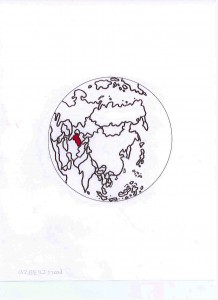UZBEKISTAN
A. THE COUNTRY
The Republic of Uzbekistan is completely surrounded by landlocked
countries. It retains a strategic position in Central Asia. It is a
multiparty republic in name only, as the autocratic dictator is firmly
in control with close ties to Russia. Economic production is
concentrated in commodities: cotton, gold, natural gas, coal, copper,
oil, silver, uranium. A fragile water supply is a strategic issue in
this heavily agriculturalist society. At harvest time, all students and
teachers are enslaved as unpaid labour to help in the fields. Revenues
from key exports are of little or no benefit to the people at large.
Uzbekistan is the main transshipment nation for the drug trade from
Afghanistan to Russia and on to Europe. Corruption permeates society.
B. THE PEOPLE
The population is ~27,795,000 and the official language is Uzbek. Much
of the population is torn between the post-Soviet regime and the
Islamist movements. The government’s “iron fist” policy is not
deterring thousands of jobless men from joining these movements.
~89.9% are Turkic, ~5.4% Iranian-Median, ~3.1% Eurasian, ~1.6% Other.
C. RELIGIONS AND CHRISTIANITY/PENTECOSTALISM
Uzbekistan is a secular state that promotes a moderate, tightly
controlled form of Islam, and strongly opposes the growing Islamist
movement. Christians are third-party victims of this struggle.
Proselytizing of Muslims is illegal – dynamic and evangelism-orientated
churches are relentlessly persecuted. Ethnic Uzbek Christians (there
are ~10,000 believers) receive particularly harsh treatment.
~84.93% are Muslim, ~13.8% Non-religious, ~0.75% claim to be Christian,
~0.2% Ethnoreligionist, ~0.16% Buddhist, ~0.16% Jewish.
In the Christian category:
Most Christians are of ethnic minorities (e.g. Russian and Korean) and
these believers have a little more freedom.
~0.28% are Protestant, ~0.3% Orthodox, ~0.1% Independent, ~0.05%
Unaffiliated, ~0.01% Catholic, ~0.01% are grouped as ‘marginal’.
Evangelicals represent ~0.3% of the population.
Charismatics represent ~0.2% and of those ~0.1% are Pentecostals.
A well-networked union of house churches helps to create stability and
support amid the persecution.
Donna Siemens
Donna Siemens
References:
http://en.wikipedia.org
Operation World, Jason Mandryk. Colorado Springs: Biblica Publishing, 2010.

